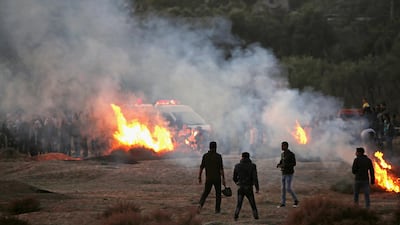Donald Trump's announcement that Washington recognises Jerusalem as Israel's capital served neither any US national security imperative whatsoever, nor his stated policy in the region. It undermines them all. Why, then, did he do it?
Mr Trump has said he wants to promote Israeli-Palestinian peace. This will make that virtually impossible. He wants to foster a new opening between Israel and Arab states. This pretty much forecloses that too.
He says his priorities are combating terrorism and confronting Iran. Yet plainly the biggest beneficiaries of this in the Middle East, apart from the Israeli right, are precisely terrorist groups like Al Qaeda and ISIL, and, even more, Iran and Hizbollah.
Some argue Mr Trump is just fulfilling a campaign promise. But he has discarded a huge number of campaign promises, impressive even by the standards of ordinary politicians. Indeed, the entire populist spirit of his campaign is about to be jettisoned for a tax bill that amounts to a massive transfer of wealth from the poor and the middle class to the wealthy, and particularly the wealthiest, Americans.
____________________
Read more from Opinion
Strategy shift begins to yield results for Saudi Arabia and its allies
Shelina Janmohamed: Daring to wear it: modest fashionwear is a bold choice
____________________
Indeed, Mr Trump ignored this very campaign promise six months ago when he, like all his predecessors, signed a national security waiver not to move the US embassy from Tel Aviv to Jerusalem. He’s still signing the waiver, but pledges to put the process, which will take at least four years, if not much longer, into motion immediately, and made the symbolic declaration and policy change unequivocally.
He could have avoided the worst harm to US national interests by clearly distinguishing between West Jerusalem and occupied East Jerusalem, and recognising only the first as Israel’s capital. Russia did precisely that in April, and met with virtually no opposition.
The United States plays a different role in the peace process and the Middle East, so any major change of American policy on Jerusalem would have provoked some indignation. But had he made such a distinction, and clearly stated that the United States was not in any sense recognising Israel's presence in, or annexation of, occupied East Jerusalem, the fallout probably would have been manageable.
He didn’t do that. Why not? And what has changed in the past six months to provoke such a drastic U-turn?
Let’s begin with what this isn’t. It’s not an expression of Mr Trump’s views or foreign policy. In fact, it runs entirely counter to all of their identifiable features.
Second, it has almost nothing to do with Jewish American power, although Mr Trump has a marginal interest in placating the few wealthy right-wing Jewish Americans, like gambling tycoon Sheldon Adelson, who have amply donated to him.
Instead, the answer does plainly lie in domestic politics, but with a different constituency. The real targets are right-wing Evangelical Christians, who are devoted to not just Israel but its occupation and, especially, Jerusalem, because of their violent fantasies – which are, ironically, largely anti-Semitic – about the Apocalypse and the second coming. Mike Pence, the vice-president, is the main broker of this unmitigated fiasco, not Jared Kushner.
But why would Mr Trump be scrambling to recklessly trash his own foreign policy to throw red meat at his key Evangelical Christian supporters, the most steadfast element of his political base right now?
Because Robert Mueller’s investigation is inching ever closer to the Oval Office. Former national security advisor Michael Flynn has turned state’s evidence, and nobody knows what information he will be sharing to protect himself and his son from serious legal jeopardy.
It’s barely conceivable that Mr Trump is defensive enough to be acting as guiltily as he has been, and appearing to engage in a huge cover-up, without any underlying criminal activity or real legal or political exposure. But it’s highly unlikely and implausible. The most recent evidence against this was his bizarre Twitter tirade last week against the FBI, his own federal police, which he denounced as corrupt, tainted and incompetent.
Why would any president denounce his own police force in such derisive terms? It’s difficult, if not impossible, not to conclude that he’s terrified of what they may one day confront him with and wishes to lay the groundwork for a broad public claim that they are pursuing a vendetta against him, either because they represent a hostile deep state or they object to him pointing out their failings in public.
Mr Trump is hovering at a dangerously low approval rating of around 35 per cent. Given the impending and extremely unpopular Republican tax bill, that’s not likely to improve. If he really does face significant legal and political exposure, it makes sense for him to shore up his most loyal supporters immediately and at all costs.
If trashing every articulated element of his own Middle East policy goals, abandoning the logic of six months ago, dispensing with the UN charter and the bedrock legal principle of the inadmissibility of the acquisition of territory by war, and upending 70 years of US policy and international consensus helps, then so be it.
This is what circling the wagons in a panic looks like. It will cause immense harm. But, until the roof falls in completely, it may prove politically effective.
Hussein Ibish is a senior resident scholar at the Arab Gulf States Institute in Washington, DC


